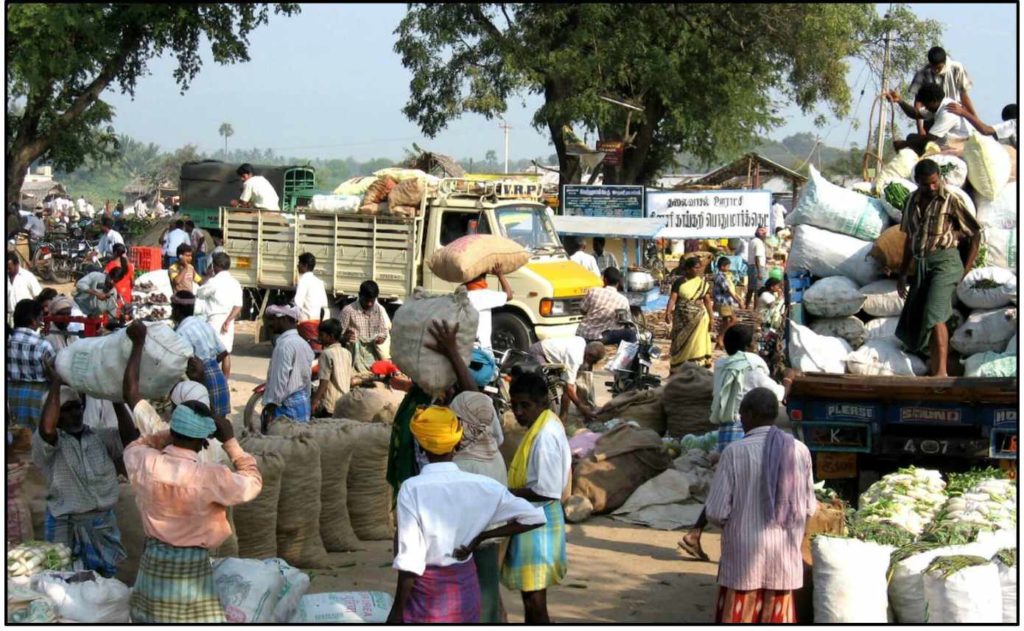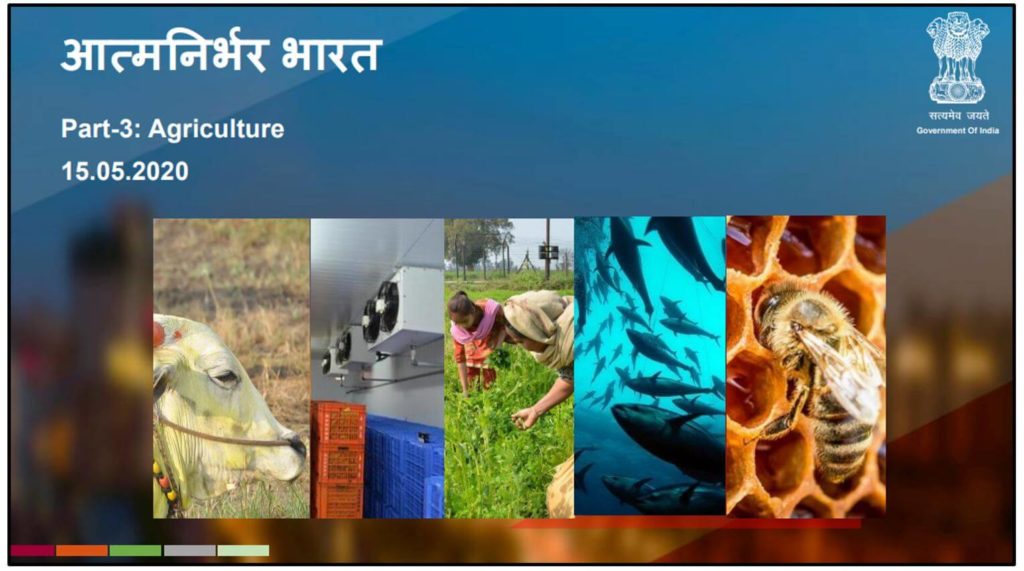The farmer distress in the country is largely on account of not getting a remunerative price for their produce. Restrictions imposed by APMC laws; exploitation of middlemen are also a reason. What reform measures has the central government announced as part of the COVID-19 package?
In an earlier explainer, we looked at what APMCs are, why they were formed, and the role they play. However, even though the APMC laws on paper may appear to be favourable to the farmers, it obliquely imposes restrictions on farmers. In this story, we take a look at the issues in APMC laws and the amendments brought about by various governments to cope with the current crisis.
Green revolution brought about a massive change in the agriculture sector. Use of machinery, high yield varieties of seeds, fertilizers, and irrigation together resulted in substantial growth in production of rice, wheat, and other agricultural products. Even though after independence, the need for a favourable environment to safeguard the interests of farmers was realized, majority of the farmers do not enjoy the fruits of their hard work, let alone profits even today. Limited marketing platforms and middlemen hegemony in mandis has led to farmers earning a low price for their produce.
FCI procured less than one-third of farmer produce in the last 16 years
Procurement by the Food Corporation of India (FCI) and other agencies of state governments is one place where the farmers get to sell their produce at the Minimum Support Price as announced by the Government of India. Yet, these agencies have together procured only about 26% of wheat and 31% of rice produced between 2002-03 and 2017-18, as per Standing Committee on Agriculture’s 2018-19 report. The remaining 69% rice and 74% wheat was sold in the outside market where there is exploitation.

The APMCs provide infrastructure for marketing and sale of agriculture produce. Under these APMC law, Principal Market Yards, Sub- Market Yards, and Purchase Centers are set up in different places. Only a total of 6,630 APMC markets were present across 27 States/UTs. States of Kerala, Bihar, Manipur, Sikkim, and Mizoram do not have any APMC market.
Farmers have to travel longer to sell their produce due to shortage in APMC markets
As per the Parliament standing committee report on ‘Agriculture Marketing and Role Of Weekly Gramin Haats’, released in January 2019, the average distance between two APMC markets was also found to be highly variable, ranging from 6km in Punjab to almost 60km in Meghalaya. On an average, the distance at a national level was about 12km. The area covered by each APMC market also followed a similar trend, ranging between 116 sq.km in Punjab to 11,215 sq.km in Meghalaya. The national average stood at 496 sq.km. What this means is that an APMC market in India covered 496 sq.km area on average, equivalent to more than four times the area of union territory Chandigarh. This uneven spread of APMC markets is in contradiction with recommendations of the National Commission on Farmers’ report published in 2006 which stated that a regulated market should be available for farmers within a radius of 5km corresponding to a market area of 80 sq.km. If the recommendation of the Commission is to be followed, then India will need 41,000 markets, which is more than 6 times the current number.
APMCs infrastructure requires modernization
One of APMCs major role is to provide necessary infrastructure to farmers for the sale of produce. Despite this, it was found out that many markets lacked the basic facilities and infrastructure. As per the standing committee report, only 83% of the markets had godowns. Cold storage facilities were available in merely 15% of the regulated markets. Only 49% of the markets had weighing facilities as per a survey conducted in 2015.
Implementation of APMC Act has also been reported to have its own lacunae. The report states that in most of the states, these committees are dominated by politicians and traders and not by farmers. Even though market fees and commission charges must be levied on traders as per the law, it was observed that the amount was collected from the farmer. In some states, as per the APMC Act adopted there, market fee is collected even if the trade transaction took place outside the market yard, while in some other states, market fees was charged up on bringing the produce to processing units. Some states had made trade transaction outside market yard illegal. To sum it up, farmers are forced to bear extra charges for selling their produce, travel longer, and have been given no choice (less competition) as the loopholes in the law are being exploited by other stakeholders.
Bureaucratic procedure, multiple charges & licenses are hindrances
Cumbersome bureaucratic procedures, just like in the case of other sectors, is also evident here as per the standing committee report. For trading in multiple APMC markets, farmers are to take multiple licenses in addition to the multiple market fee that is charged on same commodity even within the state. It is also mandatory for the farmers to sell their produce through specified channels only. They are not allowed to sign contracts with manufacturers or processors. Corruption, monopoly of traders and middlemen due to lack of competition continue to act as hindrances to farmers.
Though the government defended itself in front of the standing committee by stating that the 2017 model law addresses these shortcomings, many states are yet to adopt the law and many of its provisions. Debate on whether the APMC law needs to be repealed have been rekindled yet again amidst the COVID-19 induced lockdown.
Government has announced measures for Agricultural Marketing
Within a week of the first lockdown, the central government launched new features in the e-NAM (electronic – National Agriculture Marketing) website such as contactless remote bidding and mobile based any time payment so that the farmers need not go to banks and mandis often. This was aimed at ensuring social distancing and safety of farmers. Later, an advisory was issued to states to limit their regulations under the respective APMC Acts. States were also advised to facilitate direct marketing of agriculture produce, permit direct purchase from farmers, FPOs, and Co-operatives by bulk buyers, retailers, and processors.
Policy reforms in APMC, Essential Commodities Act, and contract farming are part of Atmanirbhar Bharath Abhiyan
Under Atmanirbhar Bharath Abhiyan announced as a part of the COVID-19 relief measures, certain reforms in the agriculture sector were also announced. These include formulation of a central law which would provide adequate choices to the farmers to sell their produce at attractive prices. The government announced that it will also ensure barrier free inter-state trade and lay out a framework for e-trading of agricultural produce. The Essential Commodities Act, 1955 will also be amended so that farmers can have better price realization on their produce such as cereals, pulses, oilseeds, onions, and potatoes. Facilitative legal framework to enable farmers to directly engage with processors, large retailers, exporters, etc. in a free and transparent manner will also be created. The reforms will also enable outside agencies procure produce from farmers directly without any intermediaries.

Multiple states have relaxed regulations in their APMC Acts
The COVID-19 induced crisis is being used by the central government to push some long pending reform measures. However, since Agriculture & Markets are in the state list of the constitution, how will these reforms override the power of states to make legislations in these areas remains to be seen. Through the COVID-19 crisis, the states ruled by the opposition have complained about centralization of power against the principles of federalism.
The BJP-ruled states of Madhya Pradesh, Uttar Pradesh, Karnataka, and Gujarat have also passed ordinances to relax regulations under the APMC laws following the Centre’s advisory.
Madhya Pradesh has promulgated an ordinance which allows a principal or sub- market yard in every market area managed by APMC, or a private market yard held by a licensed person, and electronic trading platforms, like Gujarat and Karnataka. A Director of Agricultural Marketing will also be appointed by the state government for regulating the activities of market yards and online platform.
Gujarat has allowed the state government to declare the whole state as a unified market area through a notification. The ordinance also provides for the grant of a single unified trading license, valid across all market areas in the state. Karnataka has also announced abolishment of penalty on those who use any place for trading notified agricultural products. Uttar Pradesh has exempted some fruits and vegetables from the provisions of the Act which will permit farmers to sell these products without paying mandi fees. Market fee collection has been suspended in Tamil Nadu while Uttarakhand has removed mandi fees and development cess on fruits and vegetables.
Featured Image: APMC laws


